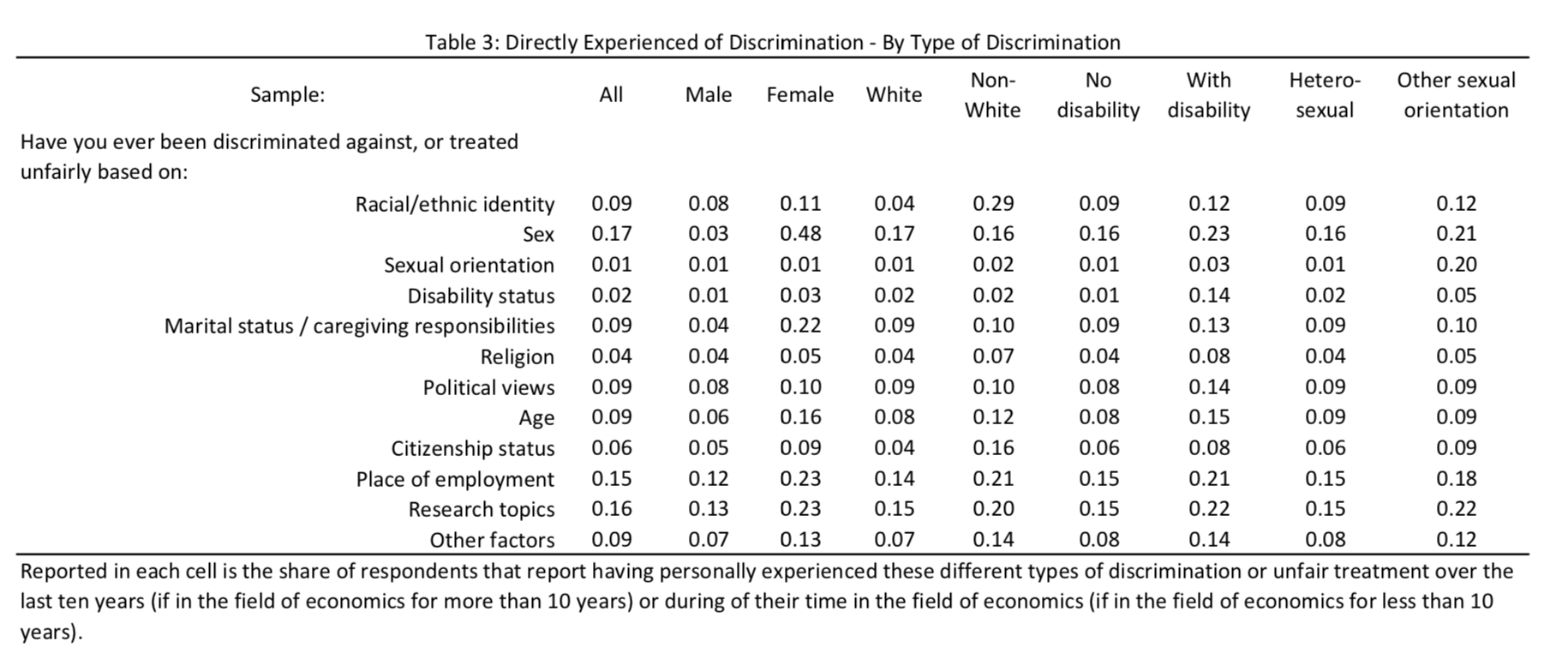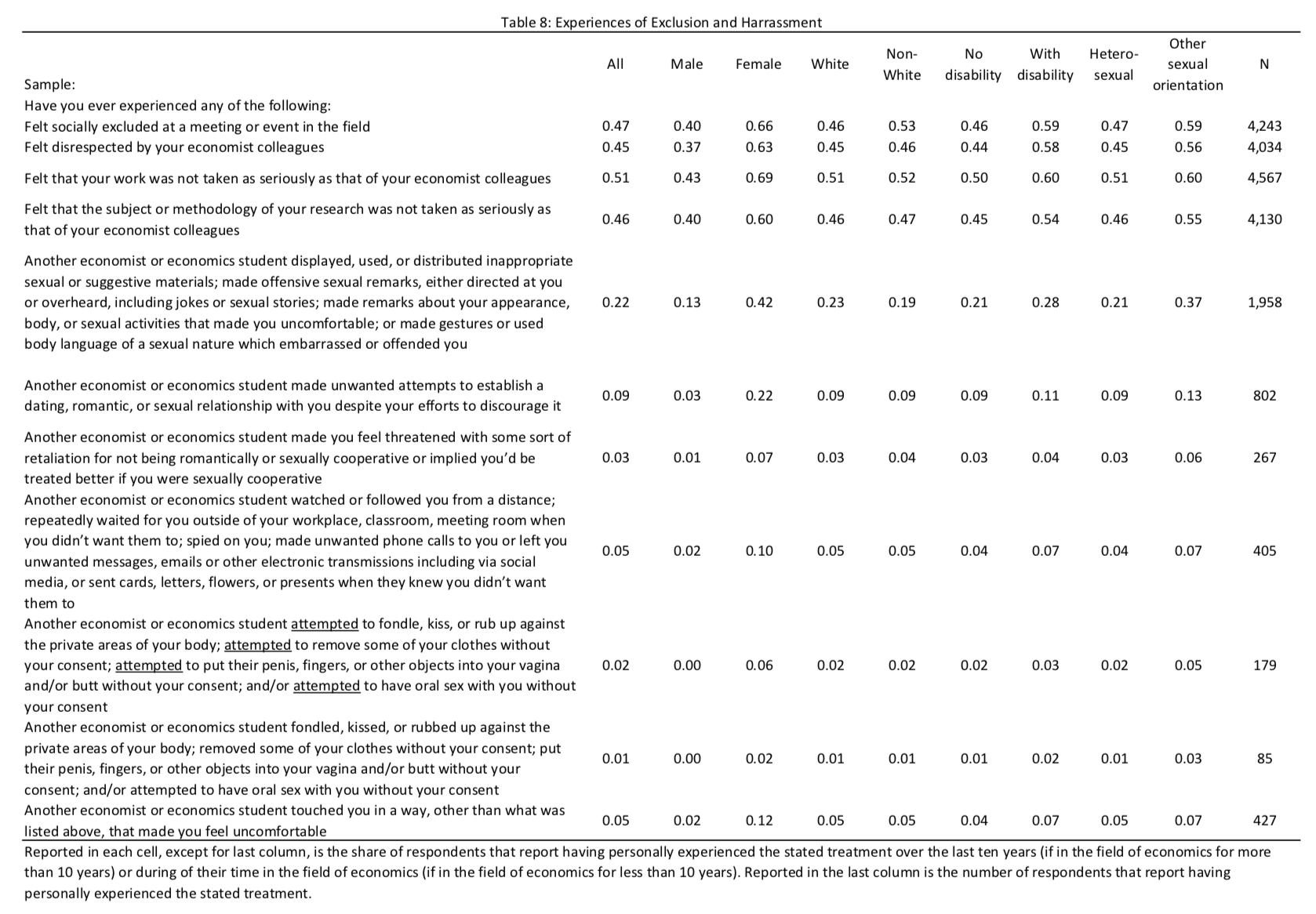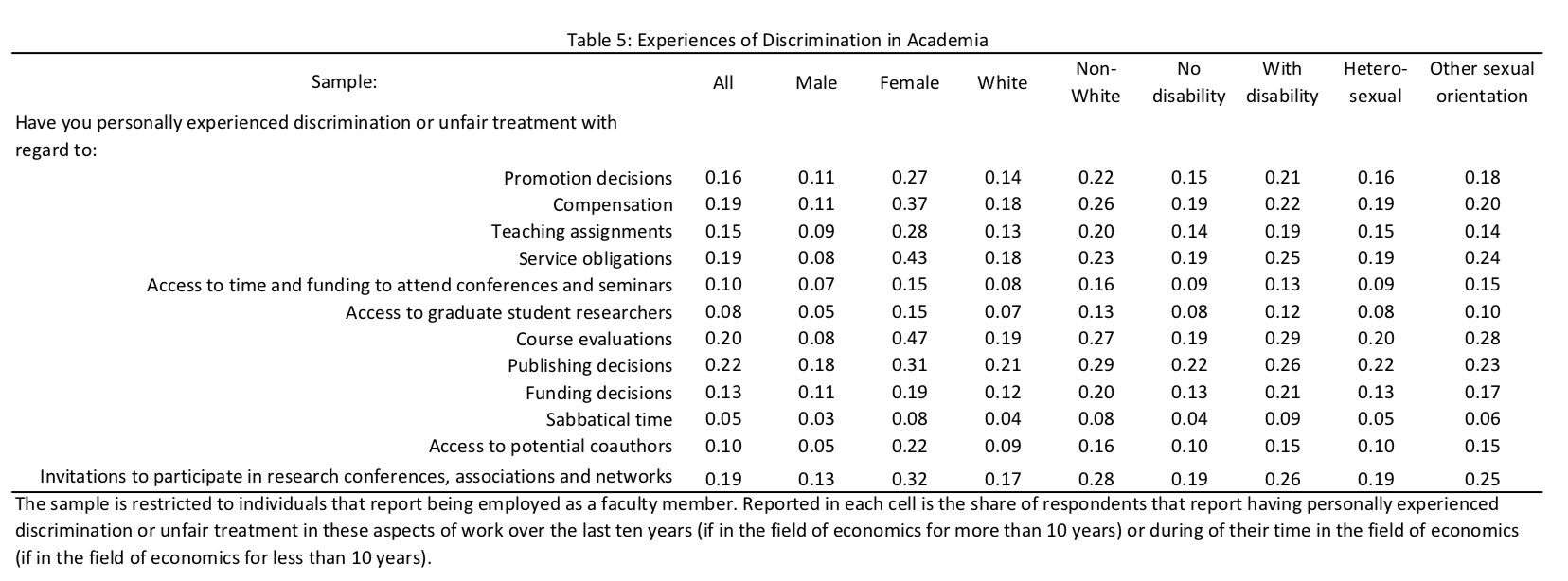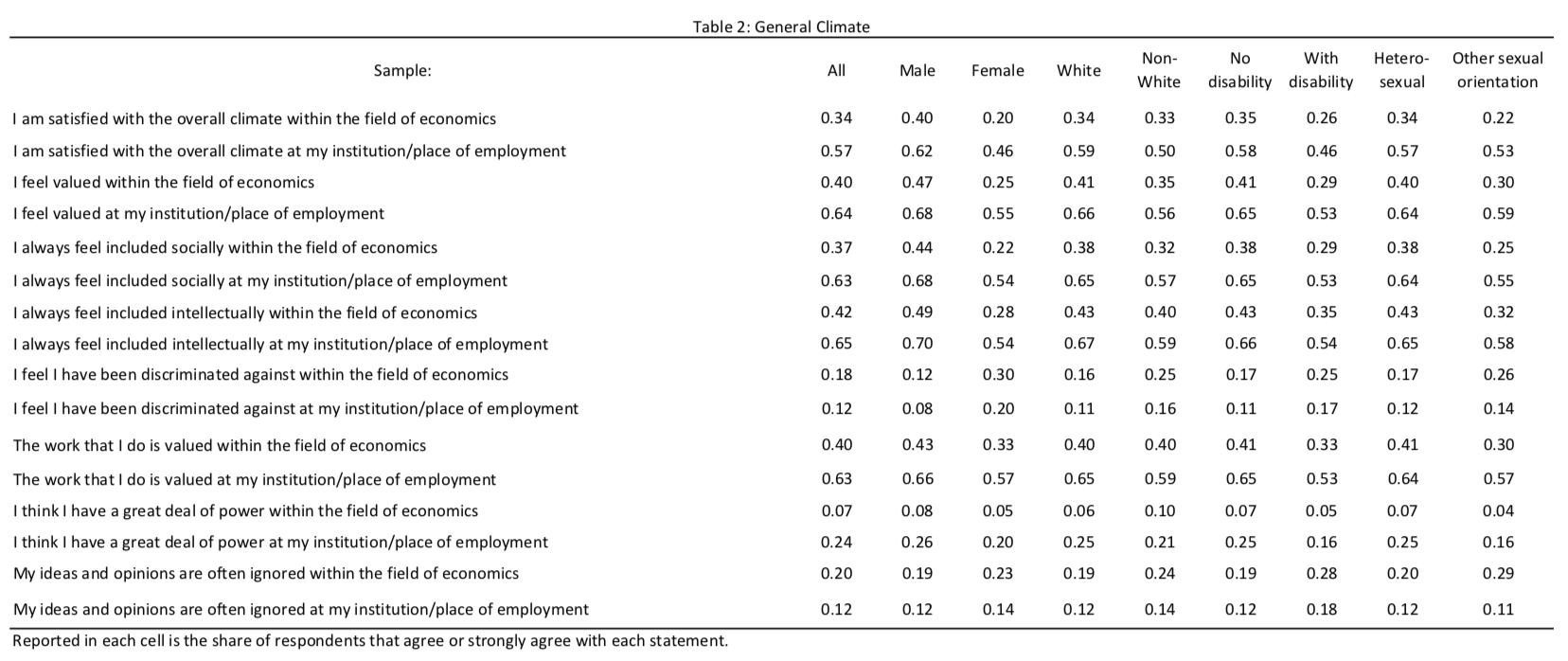You have /5 articles left.
Sign up for a free account or log in.
The American Economic Association on Monday released sobering preliminary results from its recent climate survey -- and promised action to address what it called “unacceptable” levels of harassment and discrimination among members.
Responses to questions about general climate varied by race, ability status and sexual orientation -- but especially by gender.
Just 20 percent of women surveyed said they were satisfied with the overall climate in economics, compared to 40 percent of men. Twenty-five percent of women felt valued within their field, compared to 47 percent of men. Just 22 percent of women felt included socially within economics, compared to 44 percent of men; response rates were similar to a question about whether respondents felt intellectually included.
Source: American Economic Association
Asked about specific instances of discrimination or harassment in the last 10 years, 69 percent of women said they felt their work was not taken as seriously as that of their male colleagues. A majority of women also said they’d had their research topics or methodology questioned or taken less seriously than their colleagues’. About 40 percent of men felt this way.
Forty-eight percent of women said they’d experienced sex-based bias within their last 10 years in the field. That’s compared to 3 percent of men. Twenty percent of women said they’d been discriminated against due to marital status or caregiving responsibilities, compared to 4 percent of men. Twenty-three percent of women said they’d faced bias over their research topics, and 16 percent of women had faced it due to age. Men reported significantly lower experiences of bias for both.

Major differences emerged here by race, ability and sexual orientation. Twenty-nine percent of nonwhite economists said they’d been discriminated against on the basis of race, and 20 percent of nonwhite economists said they’d experienced bias over research topics. Twenty percent of economists who identified as nonstraight said they’d been discriminated against on the basis of sexual orientation. Fourteen percent of economists with a disability had been treated differently over it.
Thirty-two percent of nonwhite economists said they’d experienced discrimination with regard to the job market. Nearly one-fifth of nonwhite economists said they’d received unfair treatment in accessing research assistantships or finding strong advisors. Economists with disabilities and non-heterosexual economists reported these kinds of biases at similar rates.
Regarding their time as economics students, 39 percent of women said they’d faced discrimination with regard to the job market. Around one-fifth of women also said they’d had trouble accessing research assistantships, advisers and quality advising, as well. The numbers for men overall were much lower.

One-third of nonwhite economists said they'd encountered bias as students on the job market, as did 28 percent of economists with a disability and one-quarter of nonstraight economists.
Forty-two percent of women said they’d seen another economist or economics student share offensive or inappropriate sexual content, language or jokes, compared to 13 percent of men. Twenty-two percent of women said another economist or student made unwanted attempts at establishing a sexual or romantic relationship despite efforts to discourage it, compared to 3 percent of men.
Six percent of women reported experiencing unwanted attempts at physical or sexual contact. Two percent of women reported actual unwanted physical contact or assault. And 7 percent said they’d been threatened or encouraged to be sexually cooperative or risk some kind of professional consequence.

About 10 percent of women reported having been spied on, waited for, left notes or gifts, or otherwise experienced unwanted behaviors, compared to 2 percent of men.
Another part of the survey looked at attempted assaults, assaults and other physical touching independently. In raw numbers, 83 respondents said they’d been assaulted (many more said they’d experienced attempted assaults or other physical touching). About half of those said their attacker was another economist or student they knew. Most did not report the assault. The top reasons for not reporting were concerns that it wouldn’t be kept confidential and fear of retribution.
Climates were rated slightly better in response to questions about economists' specific institutions, as opposed to the field in general: some 55 percent of women said they felt valued at their place of work, as did 68 percent of men, for example.
While working in academe, women reported experiencing discrimination with regard to promotion decisions (27 percent), compensation (37 percent), teaching assignments (28 percent) and service obligations (43 percent). Consistent with research suggesting that student evaluations of teaching disadvantage women due to student biases, nearly half (47 percent) of women said they’d experienced discrimination with these evaluations.

About one-third of women experienced discrimination with regard to publishing decisions and invitations to research conferences, associations and networks within their careers.
Nearly half of all women reported holding back ideas and comments at work or school and conferences to avoid possible discrimination. Many also had avoided a social event. Twenty-four percent said they’d avoided a particular research area or topic to avoid discrimination.
“Excluding or marginalizing people based on their gender, race or other personal characteristics is not only deeply unfair to those who are excluded, it damages the field as a whole by limiting the diversity of perspectives and dissuading talented people from becoming economists,” leaders, including President Ben Bernanke and President-elect Janet Yellen, said in a statement. “It is striking that, in an era when women and members of underrepresented minority groups have entered so-called STEM fields at increasing rates, the low rates of participation and advancement of women and minorities in economics have changed little in recent decades.”
The survey of some 9,200 association members (a 20 percent response rate) was conducted through the recently created Committee on Equity, Diversity and Professional Conduct. A more extensive report including statistical analysis, data from open-ended survey questions and comparisons with results of other surveys, is expected in early summer.
Numerous academic studies have documented gender disparities within economics. And graduate students recently pressured the field and association to do better in terms of enforcing professional conduct.
The association took several steps to address climate issues last year, including adopting a professional code of conduct. But the association said Monday that it continues to do more. The association’s executive committee has agreed to approve a formal policy on harassment and discrimination, building on the code of conduct. Acceptance of both will be required for participation in any association activity or committee.
An association ombudsperson will also gather and record harassment and discrimination complaints and advise the complainant as to resources and processes. With the complainant’s permission, the ombudsperson will relay reports to employers or an association liaison and, “as appropriate, investigate or otherwise follow through on complaints.”
The executive committee also agreed to approve a formal vetting process to ensure that Executive Committee members, appointed officers such as journal editors and association honorees have not violated the code or the policy on harassment and discrimination. Similarly, the committee will ask association members to approve changes to bylaws that would permit it to “remove an elected or appointed officer -- or, if warranted, to revoke the membership of any [association] member” for violations. This change recalls the case of Roland Fryer, Henry Lee Professor of Economics at Harvard University, who resigned from his executive committee post last year after it was revealed that he’d been found to have harassed workers in his lab.
Additional surveys of climate and career issues are planned.






